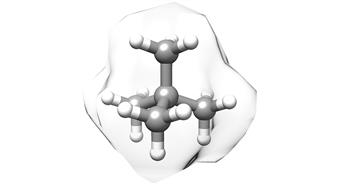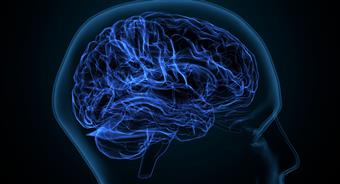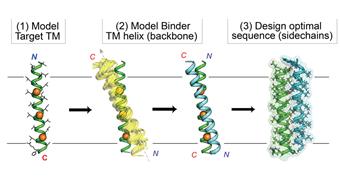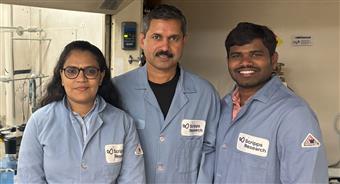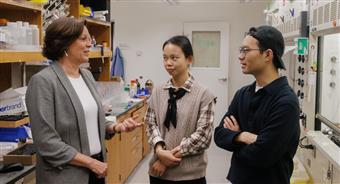
Shape-shifting ribosomes tune the cellular response to stress
November 06, 2018
Ribosomes help your cells build proteins, based on the instructions provided in genes. So, when ribosomes malfunction, disease is not far behind.
To better understand how cells respond to stressors, scientists at Scripps Research are looking to a new yeast model that reveals how human ribosomes may function in both healthy and diseased states.
The scientists recently discovered that cells can manage stress through a process they dub ribo-tuning. This means cells reprogram themselves by evolving their genes to bind to specialized ribosomes, which are produced under stress conditions. The study, which has implications for better understanding the role of ribosomes in cancer, was published recently in Cell Chemical Biology.
We created the ribo-tuning model in the lab to study how ribosomes decipher information about the amount of protein produced from an mRNA. But it turns out there's evidence in naturally occurring yeast strains that ribo-tuning happens on its own in response to stress in the cell, says senior author Katrin Karbstein, PhD, an associate professor on Scripps Research's Florida campus. This finding suggests to us that this adaptation may be a commonly used mechanism that's been previously underappreciated.
The protein behind ribo-tuning'
The scientists focused on a protein called Rps26, which the Karbstein lab had previously found helps ribosomes select individual genetic messenger molecules, called mRNAs, by recognizing the start of protein sequences and begin building proteins. People with Rps26 deficiencies can develop a bone marrow disorder called Diamond Blackfan anemia, which includes an increased risk of leukemia.
In the new study, the investigators wanted to systematically reprogram protein translation to alter the cellular response to deficiencies in the Rps26 protein. They discovered that with a single point mutation they were able to program yeast cells to change their cell wall composition, activate DNA repair, or differentiate in response to Rps26 deficiency, as well as biological stresses, which produce Rps26 deficiency. The simplicity of these adaptations via a single mutation, together with the finding that some of the changes they made were found in naturally occurring yeast strains, suggest that this ribo-tuning mechanism might be a widespread mechanism to adapt to cellular stress.
Although the research was done in yeast, it has important implications for understanding certain processes in cancer. Both cancer cells and yeast cells are known to change the composition of their ribosomes. And because cancer cells grow and divide very rapidly, they are similar to the samples of yeast that we found that have these types of mutations, says Karbstein.
Karbstein's lab will continue to study other ribosomal proteins in yeast to further decode how proteins are manufactured and mis-manufactured. In addition, they plan to look at the role of Rps26 and other ribosome-related proteins in mammalian cells in culture, with the goal of understanding more about how these proteins may contribute to cancer progression.
Students moved research forward
The new study was also a chance to train the next generation of biomedical researchers. The first author of the study was Max Ferretti, a graduate student in Karbstein's lab. The other author on the study was Jennifer Louise Barre, who at the time she conducted research was a high school student at the nearby Benjamin School.
I knew that working at Scripps would be a once in a lifetime opportunity. I was fortunate enough to work with Dr. Karbstein and also Max who was my mentor, says Barre. Going into this internship I had no idea that I would be fortunate enough to be published and I feel so lucky that I was. I was able to work with some incredible people and expand upon my knowledge of working in a lab environment, which is something I will forever be grateful for.
Karbstein's lab has hosted several high school students over the past few years, thanks to Benjamin School science teacher Renee Szeliga, and this is the second published paper with one of these students as a co-author. This collaboration with Mrs. Szeliga and The Benjamin School has been extremely rewarding for us, says Karbstein. For me personally, it is also important that we open doors for young women as they enter college, and hopefully the scientific workforce.
The study, Translational Reprogramming Provides a Blueprint for Cellular Adaptation, was funded by National Institutes of Health grants R01-GM086451 and F31- GM116406 and a Howard Hughes Medical Institute Faculty Scholar grant.
Integrative Structural & Computational Biology Karbstein, Katrin
More from Scripps
20/04/2024
New copper-catalyzed C-H activation strategy from Scripps Research Two-mode reactions inspired by human detox enzymes offer powerful new tools for drug discover...
12/04/2024
Scripps Research chemists devise easier new method for making a common type of building block for drugs Scientists transform simple linear amines into saturated...
06/04/2024
A simple, inexpensive way to make carbon atoms bind together A Scripps Research team uncovers a cost-effective method for producing quaternary carbon molecules,...
04/04/2024
Developing a vaccine for the zombie drug xylazine Scripps Research chemical biologists design an early proof-of-concept vaccine that could lead to the first...
30/03/2024
How blocking a neural receptor responsible for addiction could reduce alcohol use A Scripps Research team found that a new therapeutic that targets the kappa op...
13/03/2024
New computational strategy boosts the ability of drug designers to target proteins inside the membrane Customized-design approach could streamline the design of...
29/02/2024
Scripps Research scientists reveal how first cells could have formed on Earth New phospholipid discovery brings researchers closer to understanding how primordi...
29/02/2024
How molecular handedness emerged in early biology Scripps Research chemists fill a major gap in origin-of-life theories.
February 28, 2024
LA JOLLA, CA Mole...
22/02/2024
Snaking toward a universal antivenom Scripps Research scientists discovered antibodies that protect against a host of lethal snake venoms.
February 21, 2024
...
06/02/2024
Calibr-Skaggs announces expansion of option and license agreement with AbbVie to develop novel cell therapies for solid tumors and autoimmune diseases
AbbVie...
26/01/2024
Re-energizing mitochondria to treat Alzheimer's disease Scripps Research team restored neuron-to-neuron connections in human cells.
January 25, 2024
LA JO...
24/01/2024
100 years of Science Changing Life: Scripps Research celebrates a century of transforming human health For the last century, institute leaders and renowned scie...
23/01/2024
New technology lets researchers track brain cells' off switches The method could shed light on what goes awry in numerous brain conditions when neurons ar...
09/01/2024
Three decades of giving: Announcing the Calibr-Skaggs Institute for Innovative Medicines The ALSAM Foundation, founded by the Skaggs family, provides lasting g...
04/01/2024
Life science entrepreneur Gene Lay joins Scripps Research Board of Directors Lay, founder of the global biotech company BioLegend, brings invaluable experience ...
21/12/2023
Taming a plant-derived toxin Scripps Research team modifies the traditional poison picrotoxinin for potential neurological drugs and anti-parasite treatments. ...
19/12/2023
Scripps Research Executive Vice President Eric Topol gives TED talk on transformative power of AI in medicine Topol provides an overview of how AI models can i...
13/12/2023
New AI-powered algorithm could better assess people's risk of common heart condition Early detection of atrial fibrillation can reduce the risk of stroke an...
07/12/2023
Nanoparticle flu vaccine design shows promise in early tests Scripps Research-designed vaccine could provide broad, enduring protection against influenza A str...
16/11/2023
Numerous Scripps Research scientists named Highly Cited Researchers Clarivate's annual, global list represents researchers who have demonstrated significant...
07/11/2023
Multiple sclerosis drug invented at Scripps Research slows long-term devastating disease progression Late-breaking data reinforces the effectiveness and safety ...
05/10/2023
Keren Lasker named a 2023 Moore Inventor Fellow The prestigious award will support Lasker's inventive research in membraneless organelles and their applica...
22/09/2023
Michael Bollong named a 2023 Amgen Young Investigator The prestigious award will support Bollong's research identifying new molecular targets and therapeuti...
09/09/2023
Philip Dawson receives 2024 American Chemical Society National Award Dawson is honored with the Arthur C. Cope Late Careers Scholar Award for his foundational c...
07/09/2023
Scripps Research chemists devise a method for C-H activation of alcohols The method represents a new toolkit for making drugs and other compounds.
September 06...
31/08/2023
Scripps Research receives $1.5M to surveil infectious disease threats in wastewater Bill & Melinda Gates Foundation award to support the development of multi-pa...
16/08/2023
How cold temperatures trigger the brain to boost appetite Scripps Research scientists' discovery could lead to new weight loss and metabolic health treatmen...
08/08/2023
Human antibody that targets carfentanil, fentanyl and related opioids reverses overdose effects in preclinical study Scripps Research-developed antibody therapy...
04/08/2023
How sensory neurons impact the gut Scripps Research scientists show that the receptor PIEZO2 in sensory neurons controls gut motility and transit time, which a...
26/07/2023
AbbVie and Calibr Expand Strategic Collaboration to Advance Several Preclinical and Early-stage Clinical Assets The expanded strategic collaboration will advan...
23/07/2023
Scripps Research scientists develop AI-based tracking and early-warning system for viral pandemics Machine-learning system effectively predicts emergence of pro...
19/07/2023
Monitoring T cells may allow prevention of type 1 diabetes Scripps Research study shows that analyzing T cells in blood samples could be used to select at-risk ...
19/07/2023
Scripps Research mourns passing of leading organic chemist Albert Eschenmoser Eschenmoser pioneered key reactions in synthetic chemistry and shaped the understa...
15/06/2023
Scripps Research awarded $46.8 million by NIH to promote human health through innovative translational science and training The Translational Institute is harne...
13/06/2023
Scripps Research's Danielle Grotjahn named 2023 Pew Scholar in the Biomedical Sciences The award will support Grotjahn's study of how cells assemble the...
31/05/2023
Crossing the ring: new method enables C-H activation across saturated carbocycles Scripps Research chemists add another powerful tool to their molecular editin...
24/05/2023
Scripps Research develops behind-the-scenes tool for better biomedical data discovery The new resource makes datasets more discoverable for life science communi...
19/05/2023
Scripps Research neuroscientist Hollis Cline elected to American Academy of Arts and Sciences Cline is recognized for her discoveries about the role of sensory ...
19/05/2023
Scripps Research's Skaggs Graduate School awards doctoral degrees to 31st graduating class Commencement ceremony will be livestreamed via Zoom and on instit...
13/05/2023
A better route to benzocyclobutenes, sought-after building blocks for drugs Scripps Research chemists devise a new, C-H activation-based method for the synthesi...
09/05/2023
Renowned Scripps Research professor Jeffery Kelly elected to National Academy of Sciences Kelly's groundbreaking work on protein misfolding has led to thera...
28/04/2023
Mirror-image molecules pave new path for cancer drug discovery By comparing how mirror image versions of small molecules impact clusters of proteins, Scripps R...
22/04/2023
How alcohol consumption contributes to chronic pain A Scripps Research team showed how both alcohol intake and alcohol withdrawal can lead to increased pain and...
21/04/2023
Xin Jin receives dual awards to study autism risk genes in neurodevelopment Major grants from the National Institutes of Health and California Institute for Reg...
20/04/2023
Trim the sugar: New HIV vaccine design improves immune response Scripps Research vaccine candidate headed for clinical trials.
April 19, 2023
LA JOLLA, CA A...
18/04/2023
Therapeutic can seek and destroy potent opioid to treat overdoses Scripps Research chemists developed a new biologic to work against the synthetic opioid carfen...
07/03/2023
How heavy alcohol consumption increases brain inflammation The findings by a Scripps Research team point toward a potential new drug target for treating alcohol...
02/03/2023
Scientists find human antibodies that can block multiple coronaviruses including SARS-CoV-2 Results from a Scripps Research and UNC team pave the way for a vacc...
28/02/2023
$10 million grant funds Scripps Research Alcohol Research Center through its 50th year The five-year grant supports research into the neurobiology of alcohol us...
28/02/2023
Immune system drug shows promise in treating alcohol use disorder, a Scripps Research clinical trial reports Scientists at Scripps Research found that apremilas...
 Shape-shifting ribosomes tune the cellular response to stress
Shape-shifting ribosomes tune the cellular response to stress 















